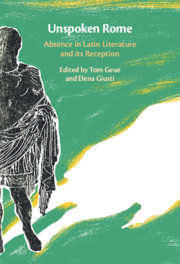Book contents
- Unspoken Rome
- Unspoken Rome
- Copyright page
- Contents
- Figures
- Unspoken Rome: Acknowledgements
- Contributors
- Introduction
- Part I Absence in Text
- Part II Absence in Context
- Part III Going Beyond
- Chapter 13 The Slave, Between Absence and Presence
- Chapter 14 In Search of the Lost City
- Chapter 15 Omnibus umbra locis adero
- Chapter 16 The Philology of Grief
- Chapter 17 Absence, Metaphysically Speaking
- Afterword Lights Out
- Bibliography
- General Index
- Index Locorum
Chapter 15 - Omnibus umbra locis adero
Elena Ferrante and the Poetics of Absence
from Part III - Going Beyond
Published online by Cambridge University Press: 03 September 2021
- Unspoken Rome
- Unspoken Rome
- Copyright page
- Contents
- Figures
- Unspoken Rome: Acknowledgements
- Contributors
- Introduction
- Part I Absence in Text
- Part II Absence in Context
- Part III Going Beyond
- Chapter 13 The Slave, Between Absence and Presence
- Chapter 14 In Search of the Lost City
- Chapter 15 Omnibus umbra locis adero
- Chapter 16 The Philology of Grief
- Chapter 17 Absence, Metaphysically Speaking
- Afterword Lights Out
- Bibliography
- General Index
- Index Locorum
Summary
This chapter explores Elena Ferrante’s use of Virgil’s Dido as a model for Elena and Lila, the two protagonists of the Neapolitan Novels, through the lens of absence. Not only is Ferrante able to conjure and comment on the Aeneid’s treatment of one of its most divisive characters following the classical rules of intertextual engagement with the ghosts of masterpieces past; she ends up changing the whole game. By teasing narrative material out of Virgil’s silences in Dido’s story-arch, Ferrante centres and requalifies the very reason of Dido’s undoing – the trauma which stems from the loss of love – as the generative force behind both Elena’s and her own literary output. However, by making Lila’s invisible writing and her subsequent disappearance into the beating heart of Elena’s writing, Ferrante uses Virgil as her Muse to stage a woman-centred takeover of literary greatness. Elena’s anxieties over how much of Lila’s life she has truly cannibalized, and her responsibility in Lila’s disappearance, not only take Virgil to task for hiding his Muse, but suggest an alternative model of criticism; moving beyond the postmodern view of the absent author and his unaccountability by giving agency back to the Muse.
- Type
- Chapter
- Information
- Unspoken RomeAbsence in Latin Literature and its Reception, pp. 270 - 288Publisher: Cambridge University PressPrint publication year: 2021

